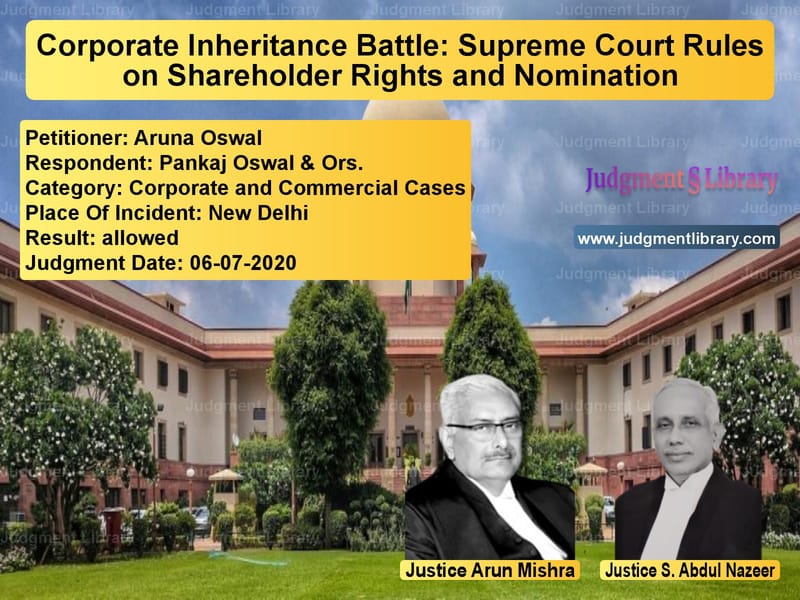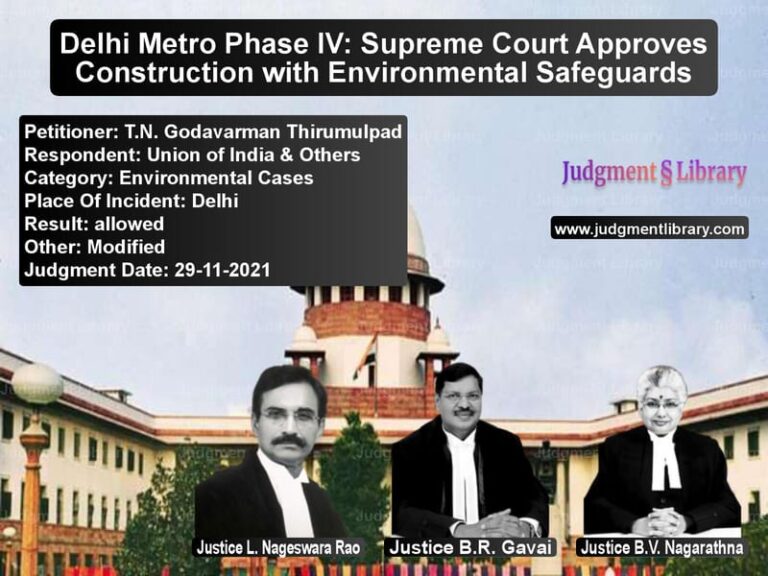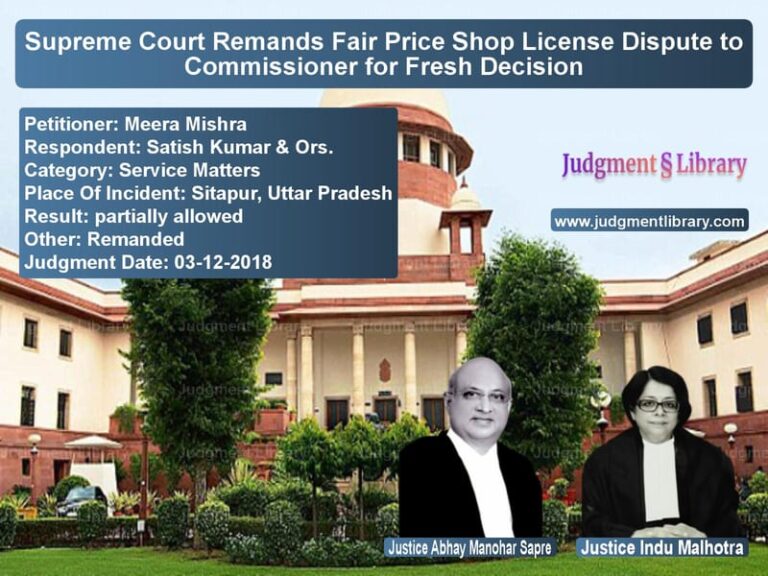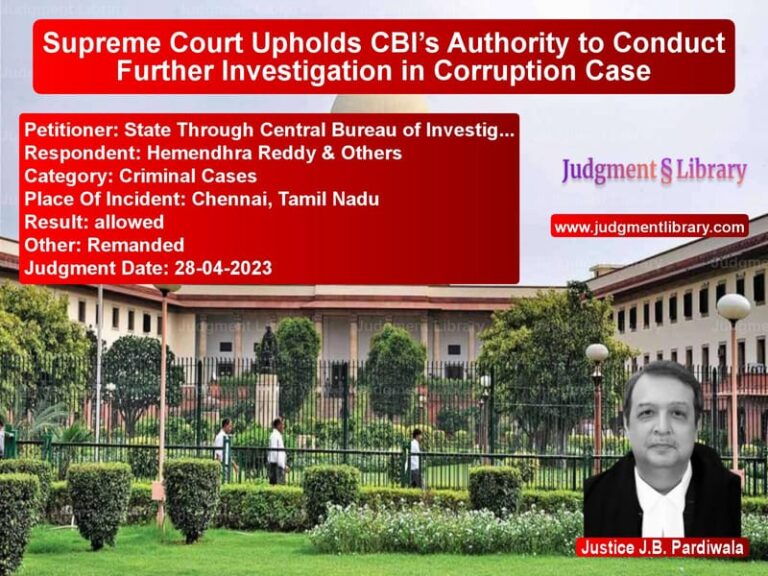Corporate Inheritance Battle: Supreme Court Rules on Shareholder Rights and Nomination
The Supreme Court of India recently delivered a significant judgment in the case of Aruna Oswal vs. Pankaj Oswal & Ors., addressing critical issues related to share inheritance, nomination under the Companies Act, and the jurisdiction of the National Company Law Tribunal (NCLT). The dispute arose after the demise of industrialist Abhey Kumar Oswal, whose substantial shareholding in Oswal Agro Mills Ltd. became the subject of a fierce family legal battle.
This case primarily revolved around whether a nominee under Section 72 of the Companies Act, 2013, can claim absolute ownership of shares to the exclusion of legal heirs or if such nomination is merely a means of facilitating transfer. The judgment also dealt with the maintainability of a petition under Sections 241 and 242 of the Act, alleging oppression and mismanagement, in the face of a pending civil dispute regarding inheritance.
Background of the Case
Late Mr. Abhey Kumar Oswal, a well-known industrialist, held approximately 5,35,39,960 shares in M/s. Oswal Agro Mills Ltd., a publicly listed company. On June 18, 2015, he executed a nomination in favor of his wife, Mrs. Aruna Oswal, under Section 72 of the Companies Act, 2013. This nomination, attested by two witnesses, explicitly stated: “This nomination shall supersede any prior nomination made by me/us and any testamentary document executed by me/us.” After his death in Russia on March 29, 2016, the company registered Mrs. Aruna Oswal as the legal holder of the shares on April 16, 2016.
However, Mr. Pankaj Oswal, the son of the deceased, filed a partition suit, claiming a one-fourth share in his father’s estate. He also alleged oppression and mismanagement in the company and sought intervention from the NCLT. His contention was that the nomination did not override his legal right to inheritance and that the transmission of shares to Mrs. Aruna Oswal was illegal.
Arguments Presented
Petitioner’s Arguments (Mrs. Aruna Oswal)
- The nomination made under Section 72 conferred absolute ownership of the shares upon her, making her the rightful owner.
- Mr. Pankaj Oswal held only 0.03% of the total shareholding, which he acquired after filing a civil suit. As per Section 244 of the Companies Act, a petitioner must hold at least 10% of the shareholding to file a complaint under Sections 241 and 242.
- The allegations of oppression and mismanagement were vague and lacked merit.
- The matter was already under consideration in a civil suit for partition, making the company petition inappropriate and amounting to forum shopping.
- The High Court had already ordered status quo on shareholding, reinforcing her ownership.
Respondent’s Arguments (Mr. Pankaj Oswal)
- The nomination under Section 72 was only for the facilitation of transfer and did not override inheritance rights.
- As the son and legal heir of the deceased, he had a legitimate claim to one-fourth of the shares.
- The NCLT had jurisdiction to address allegations of oppression and mismanagement even if a civil suit was pending.
- Even a minority shareholder could raise grievances about corporate mismanagement.
Supreme Court’s Observations
The Supreme Court, after a detailed analysis, ruled that nomination under Section 72 confers absolute ownership upon the nominee. The Court observed:
“It is prima facie apparent that vesting is absolute, and the provisions supersede, by virtue of a non-obstante clause, any other law for the time being in force.”
The Court noted that a legal representative has the right to challenge corporate mismanagement but only if the eligibility criteria under Section 244 are met. In this case, Mr. Pankaj Oswal’s claim was based on an unresolved inheritance dispute, which was not a matter for the NCLT but for a civil court.
Judgment and Final Verdict
The Supreme Court dismissed the petition before the NCLT, stating:
“The entitlement of respondent No.1 is under a cloud of pending civil dispute. We deem it appropriate to direct the dropping of the proceedings filed before the NCLT.”
The Court ruled that:
- The NCLT cannot adjudicate inheritance disputes; such matters must be resolved in civil courts.
- Since Mr. Pankaj Oswal did not meet the 10% shareholding requirement, his petition under Sections 241 and 242 was not maintainable.
- The pending civil suit should determine the rightful ownership of the shares.
Significance of the Judgment
This ruling is crucial in clarifying the rights of nominees versus legal heirs in corporate shareholding disputes. It reaffirms that:
- A nominee under Section 72 becomes the absolute owner of shares unless the nomination is legally challenged and set aside.
- Inheritance disputes should be settled in civil courts, not company law tribunals.
- Shareholders must meet eligibility thresholds before invoking corporate mismanagement laws.
The judgment is expected to have a significant impact on corporate governance and shareholder rights in India, reinforcing the principle that personal inheritance disputes should not interfere with corporate structures.
Petitioner Name: Aruna Oswal.Respondent Name: Pankaj Oswal & Ors..Judgment By: Justice Arun Mishra, Justice S. Abdul Nazeer.Place Of Incident: New Delhi.Judgment Date: 06-07-2020.
Don’t miss out on the full details! Download the complete judgment in PDF format below and gain valuable insights instantly!
Download Judgment: Aruna Oswal vs Pankaj Oswal & Ors. Supreme Court of India Judgment Dated 06-07-2020.pdf
Direct Downlaod Judgment: Direct downlaod this Judgment
See all petitions in Company Law
See all petitions in Shareholder Disputes
See all petitions in Corporate Governance
See all petitions in Judgment by Arun Mishra
See all petitions in Judgment by S. Abdul Nazeer
See all petitions in allowed
See all petitions in supreme court of India judgments July 2020
See all petitions in 2020 judgments
See all posts in Corporate and Commercial Cases Category
See all allowed petitions in Corporate and Commercial Cases Category
See all Dismissed petitions in Corporate and Commercial Cases Category
See all partially allowed petitions in Corporate and Commercial Cases Category







